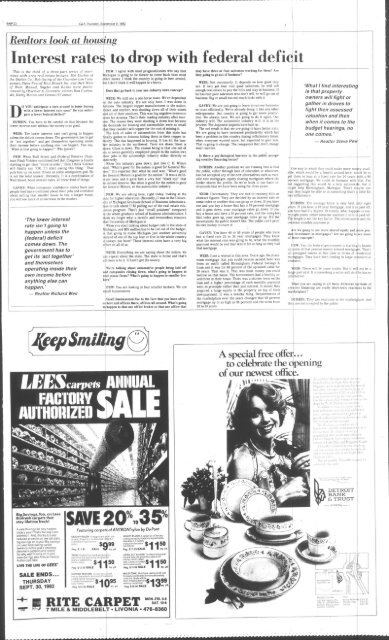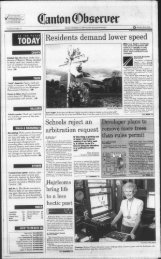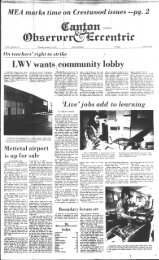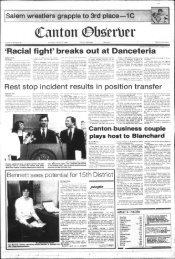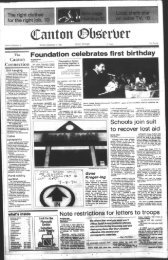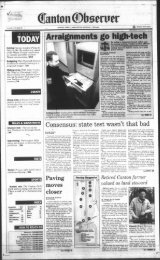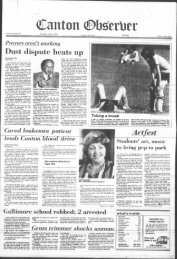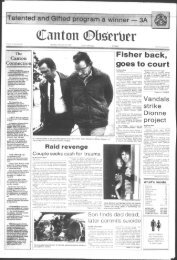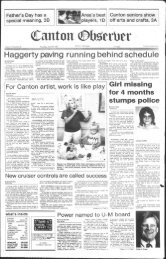Canton Observer for September 9, 1982 - Canton Public Library
Canton Observer for September 9, 1982 - Canton Public Library
Canton Observer for September 9, 1982 - Canton Public Library
Create successful ePaper yourself
Turn your PDF publications into a flip-book with our unique Google optimized e-Paper software.
6A(P,C) O&E Thursday, <strong>September</strong> 9, <strong>1982</strong><br />
Realtors look at housing<br />
Interest rates to drop with federal deficit<br />
This is the third of a three-part senes of interinews<br />
unth area real estate brokers. Mel Durbin of<br />
the Durbin Co., Bob Gavey of the Chamberlain Companies,<br />
Steve Pew of Max Broock Inc. ami Dick Weir<br />
of Weir, Manuel, Snyder ami Ranke were intereiHewed<br />
by <strong>Observer</strong> & Eccentric editors Ron Garbinski.<br />
Kathy Moran and Dennis O'Connor<br />
D<br />
0 YOU anticipate a turn around in home buying<br />
with a lower interest rate soon? Do you anticipate<br />
a lower federal deficit?<br />
DURBIN: You have to be careful on that because the<br />
lower interest rate without the money is no good.<br />
WEIR: The lower interest rate isn't going to happen<br />
unless the deficit comes down. The government has to get<br />
its "act together" and get themselves operating inside<br />
their income be<strong>for</strong>e anything else can happen You say,<br />
"When is that going to happen''" Who knows 9<br />
PEW: When Wall Street and (Federal Reserve Chairman<br />
Paul) Volcker combined feel that Congress is finally<br />
starting to get their "store in order," then I think Volcker<br />
will finally say "OK, I'll start easing this thing." That<br />
puts him up on some throne as some omnipotent god. He<br />
is not the total answer, obviously It is a combination of<br />
Wall Street, bond interest rates, all these kind of things.<br />
GAVEY: When comsumer confidence comes back and<br />
people feel more confident about their jobs and confident<br />
about selling that smaller house to buy a larger house,<br />
you will see more of an increase in the market<br />
"<br />
'The lower interest<br />
rate isn't going to<br />
happen unless the<br />
(federal) deficit<br />
comes down. The<br />
government has to<br />
get its act together'<br />
and themselves<br />
operating inside their<br />
own income be<strong>for</strong>e<br />
anything else can<br />
happen.'<br />
— Realtor Richard Weir<br />
Ifeep Smiling<br />
Big Savlngs,Too, on Lees<br />
Biofreshcarpets that<br />
stay lifetime fresh!<br />
A sale this big can only happen<br />
once a year! That's the way Lee:<br />
planned it And, thanks to Lees<br />
reduced prices to us, we can pass<br />
big savings on to you! Big savings<br />
on Lees best-selling carpet<br />
fashions in this year's smartest<br />
decorator patterns and colors!<br />
So why wait? Come on in and<br />
save during Lees Annual Factory<br />
Authorized Sale<br />
UVI THE LIFE OF LEES'<br />
SALE ENDS...<br />
THURSDAY<br />
SEPT. 30, <strong>1982</strong><br />
*•<br />
PEW: I agree with most prognosticators who say that<br />
Michigan is going to be slower to come back than most<br />
pther states. I think the country is going to turn around,<br />
tyut I don't think it will happen in a hurry.<br />
Does that go back to your one-industry town concept?<br />
WEIR: We still are a one-horse town. We're dependent<br />
dn the auto industry. It's not only here. I was down in<br />
Arizona. The largest copper manufacturer in the nation,<br />
iner and smelter, was shutting down all of their mines<br />
nd all of their smelters. This was big negative economic<br />
ews <strong>for</strong> Arizona. That's their leading industry after tourm<br />
The reason they were shutting it down was because<br />
ne demands <strong>for</strong> housing and automobiles were so small<br />
tiat they couldn't sell copper <strong>for</strong> the cost of mining it.<br />
The lack of sales of automobiles from this state has<br />
finally gotten to Arizona hitting them in their copper iniustry<br />
This has happened in housing. It has hit the lumr<br />
industry in the northwest. Tires are down. Steel is<br />
own. Glass is down. The reason being is that one out of<br />
s|ix or seven gainfully employed people in the nation owe<br />
tfieir jobs to the automobije industry either directly or<br />
indirectly.<br />
When this industry goes down, just like C. E. Wilson<br />
slid, "What's good <strong>for</strong> the nation is good <strong>for</strong> General Motors."<br />
It's reported that what he said was, "What's good<br />
<strong>for</strong> General Motors is good <strong>for</strong> the nation." It was a deliberate<br />
twist and it gave him a very bad "black eye" that<br />
he did not deserve. But what is good <strong>for</strong> the nation is good<br />
<strong>for</strong> General Motors, or the automobile industry.<br />
PEW: We are sitting here, right today, looking at the<br />
c its <strong>for</strong> higher education. (Recently,) I was in the Univers<br />
ty of Michigan Graduate School of Business Administration<br />
to talk about U-M pulling out of the real estate educition<br />
program. That's just "small potatoes" compared<br />
to the whole graduate school of business administration. I<br />
think we <strong>for</strong>get what a terrific and tremendous resource<br />
that University of Michigan is.<br />
When you start talking about budget cuts in the state of<br />
Michigan, and $85 million has to be cut out of the budget,<br />
is that going to make Michigan just another university<br />
lr stead of one of the top four or five in the whole country<br />
itl always has been? These interest rates have a very big<br />
feet on all of us.<br />
WEIR: Everything we are saying about the nation, we<br />
cjin repeat about the state. The state is broke and that's<br />
1 there is to it. It hasn't got the money.<br />
We're talking about automotive people being laid off<br />
a id companies closing down, what's going to happen to<br />
real estate firms? What's going to happen to smaller brok<br />
-rs?<br />
PEW: You are looking at four smaller brokers. We are<br />
sihall businessmen.<br />
Small businessmen due to the fact that you have offices!<br />
here and offices there, offices fall around. What's going<br />
to happen to that one office broker or that one office that<br />
g<br />
—<br />
SAVE 20<br />
Featuring carpets of ANTRON'nylon by DuPont<br />
SAXONY PLUSH. A magnificent pl ush pile<br />
so deep it Haunts a custom look St ('led in<br />
a rainbow ot high lashion ^<br />
COlOrS S Q 9 9<br />
Reg $1195 SALE sq. yd<br />
TWIST. Crafted from hard twisted njlon<br />
yarns that are specifically designed lor<br />
years of outstanding ^ _ J Eft<br />
per<strong>for</strong>mance JC m JjU<br />
Reg $13 99 SALE I I sq yd<br />
CARVED TEXTURE A luxurious cjrved<br />
texture that reltects the finest of traditional<br />
carpet styling Designed.<br />
to perlorm anywhere in C mM<br />
husv busy homes homo«i V<br />
Reg $12.99 SALE<br />
sq. yd<br />
VELVET PLUSH. A carpet <strong>for</strong> all the decorating<br />
versatility modern living demands.<br />
Available in a medley . _<br />
of popular decorator £ gf ^ K Q<br />
coiorations<br />
Reg $13 99 SALE<br />
%<br />
sq yd.<br />
LEVEL CUT & LOOP. This fascinating level<br />
cut and loop pile gives the carpet a distinctive<br />
hand-crafted<br />
look Comes in today's<br />
fashionable colors.<br />
Reg $13.99 SALE<br />
RITE CARPET<br />
50<br />
aq yd<br />
MULTI-TONE. Multi tone saxony plush can<br />
be easily coordinated to many decorating<br />
schemes Made with to ^<br />
day's most durable longC<br />
wearing carpet fiber <br />
Reg. $16.99 SALE<br />
MON.-FRI. 9-9<br />
SAT. 10-6<br />
7 MILE & MIDDLEBELT • LIVONIA • 476-8360<br />
may have three or four salesmen working <strong>for</strong> them? Are<br />
they going to go out of business?<br />
WEIR: Not necessarily. It depends on how good they<br />
are. If he's got four real good salesmen, he will sell<br />
enough real estate to pay the bills and stay in business If<br />
he has four poor salesmen who don't sell, he will go out of<br />
business. Big or small has not much to do with it.<br />
GAVEY: We are just going to learn to run our businesses<br />
more efficiently. We're already doing it like any other<br />
entrepreneur. Our country is going to get more productive.<br />
We always have. We are going to do it again. Our<br />
industry will. The automobile industry will; it is in the<br />
process. The Japanese imports have hurt us.<br />
The net result is that we are going to have better cars.<br />
We are going to have increased productivity which has<br />
been a problem in this country during inflationary times,<br />
when everyone wanted more, but expected to give less.<br />
That is going to change. The companies that don't change<br />
won't survive.<br />
e<br />
Is there a psychological barrrier to the public accepting<br />
creative financing terms?<br />
DURBIN: Another problem we are running into is that<br />
the public, either through lack of education or whatever,<br />
has not accepted any of the new alternatives such as variable<br />
rate mortgages, equity sharing mortgates where the<br />
lender shares the profits. So we're back to our basic instruments<br />
that we have been using <strong>for</strong> three years<br />
WEIR: Uncertainity. They are tied to treasury bills or<br />
abstract figures. They are decided by an interest rate or<br />
some index or another that can go up or down. If you have<br />
one and you buy a house that has a 70 percent mortgage<br />
and it goes down, your mortgage rates go down If you<br />
buy a house and have a 14 percent rate, and the rates^fon,<br />
that index goes up, your mortgage rates go up. It's* the<br />
uncertainity the public doesn't like. The public can't print<br />
its own money to cover it.<br />
GAVEY: You have 40 or 50 years of people who have<br />
had a fixed rate 25 to 30 year mortgages. They knew<br />
what the interest rate was going to be, what the monthly<br />
payment would be and that was it <strong>for</strong> as long as they had<br />
that mortgage.<br />
WEIR: I see a retreat in this area. Years ago, thejnaximum<br />
mortgage that you could receive around here was<br />
from an outfit called Birmingham Federal Savings &<br />
Loan and it was <strong>for</strong> 60 percent of the apraised value <strong>for</strong><br />
20 years. That was it. That was most money you could<br />
borrow on that house. The homeowners had a healthy investment<br />
in their house. There was a shorter term on the<br />
loan and a higher percentage of each monthly payment<br />
went to principle rather than just interest. It meant they<br />
acquired a large equity in the property on top of their<br />
downpayment. It was a healthy thing. Requirements of<br />
the marketplace over the years changed that 60 percent<br />
mortgage up to as high as 95 percent and the term from<br />
20 to 30 years.<br />
A special free offer « • «<br />
to celebrate the dpening<br />
of our newest offic<br />
1 1 1 ^ 1 ? *. V<br />
'What I find interesting<br />
is that property<br />
owners will fight or<br />
gather in droves to<br />
fight their assessed<br />
valuation and then<br />
when it comes to the<br />
budget hearings, no<br />
one comes. 9<br />
— Realtor Steve Pew<br />
One way in which they could make more mot ey avail-<br />
)le, which would be a benefit around here, wc uld be to<br />
gj>t them to loan at a fixed rate <strong>for</strong> 20 years vith a 60<br />
percent mortgage. We could do business with that. I'm<br />
)t suggesting this would be a help nationwid e. but it<br />
ight help Birmingham, Michigan That's m aybe one<br />
ay they might be able to do something that's a little bit<br />
less inflationary<br />
DURBIN: The average home is only held enly eight<br />
years. If you have a 20 year mortgage, and it is paid off,<br />
yoju have had 2V2 buyers. In reality, what happefi s is eve-<br />
ry|eight years, either someone assumes it or it is paid off<br />
The length is not the key factor The amortization and the<br />
constant monthly payment is<br />
ire we going to see more shared equity and rtiore pensiofa<br />
investment in mortgages? Are we going to|see more<br />
of those concepts?<br />
EW: Yes, the federal government is starting to loosen<br />
ome of that pension money toward mortgag es That's<br />
jncapped source at this time in terms of r psidential<br />
moitgages. They have been lending in large commercial<br />
ven ures.<br />
VyEIR: There will be some trades. But it will not be a<br />
larj e part of it It is something a seller will do if-he has no<br />
alte rnative<br />
YVhat you are saying is all these different m ethods of<br />
creative financing are really short-term reacti >ns to the<br />
marketplace?<br />
DURBIN: They are reactions to the marketplace And<br />
they are not accepted by the public<br />
&<br />
To u'lebrate flu- opening ot our n<br />
hr.ituh oltue on l"i^hi Mil*.' Koad<br />
Hiij&criv wcVt making vou this s<br />
tire otter lust open .i new eluvku<br />
s.ivinr .uvounr tor S-W or add<br />
your present savings amount. and<br />
tn--i three (Mi i i' |'i.uv m hnu: "f '" 11<br />
vna!<br />
Chip.i In W M Daltun is \ours In<br />
111 .kiduu'll OtkV \Oll h.lN. I' St.!<br />
your collivwrv. v


